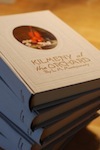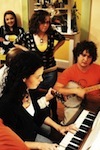My mother adored Daddy, as she called him, but she swooned for Ravel. Family legend has it that a recording of Ravel’s best known piece, Bolero, which somehow turned up in my mother’s possessions when in high school, was promptly destroyed, being deemed far too sensuous for the impressionable oldest daughter of a Swedish Baptist preacher. And she could painfully recall not being able to attend a friend’s birthday party as a child in Pasadena, because the planned activity for the group was to see a movie — a novel, rare treat in 1930. The first time I saw the film Babette’s Feast, I had some inkling of the dilemma my mother’s upbringing must have wrought in her blossoming creative life, as it would later in mine.
 It is a small but real thing that each of us can enter into this practice of conservation believing that we can be part of tangible renewal. For some, it might take the shape of educating or gardening. For others it might look like banking or engineering, a public office or scientific research. It takes all kinds to accomplish the greater good. And it matters for us to practice renewal. It matters because God loves what He made, and when you love someone, you are drawn to love what they love.
It is a small but real thing that each of us can enter into this practice of conservation believing that we can be part of tangible renewal. For some, it might take the shape of educating or gardening. For others it might look like banking or engineering, a public office or scientific research. It takes all kinds to accomplish the greater good. And it matters for us to practice renewal. It matters because God loves what He made, and when you love someone, you are drawn to love what they love. It is a small but real thing that each of us can enter into this practice of conservation believing that we can be part of tangible renewal. For some, it might take the shape of educating or gardening. For others it might look like banking or engineering, a public office or scientific research. It takes all kinds to accomplish the greater good. And it matters for us to practice renewal. It matters because God loves what He made, and when you love someone, you are drawn to love what they love.
It is a small but real thing that each of us can enter into this practice of conservation believing that we can be part of tangible renewal. For some, it might take the shape of educating or gardening. For others it might look like banking or engineering, a public office or scientific research. It takes all kinds to accomplish the greater good. And it matters for us to practice renewal. It matters because God loves what He made, and when you love someone, you are drawn to love what they love.
































